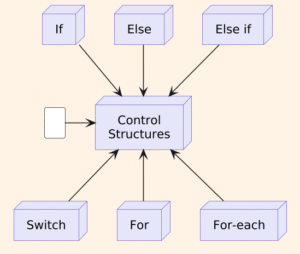- Declaring Variables in PHP
- PHP Data Types
- PHP Arrays
- Types of PHP Operators
- PHP Strings
- PHP Expressions
- PHP Control Structures
- PHP Functions
- PHP Form Handling – Read Form Inputs & Handle File Uploads
- How to Connect PHP to MySQL Database Using MySQLi
- Executing Simple Queries in PHP
- Handling Results in PHP
- Handling Sessions and Cookies
PHP Control Structures
PHP (Hypertext Preprocessor) is a widely-used open-source scripting language, especially suited for web development. It allows developers to create dynamic content and interact with databases. One of the key aspects of PHP programming is the use of control structures. These structures guide the flow of program execution based on conditions or repeated tasks.
Types of Control Structures
Control structures in PHP are mainly of three types: conditional statements, loop statements, and jump statements.
Conditional Statements
Conditional statements execute certain blocks of code depending on conditions.
if Statement
The if statement runs a block of code if a condition is true.
Syntax
if (condition) {
// code to execute if condition is true
}
Example
$t = date("H");
if ($t < "20") {
echo "Have a good day!";
}
Output:
Have a good day!
if…else Statement
The if…else statement executes one block if the condition is true, another if false.
Syntax
if (condition) {
// code if true
} else {
// code if false
}
Example
$t = date("H");
if ($t < "20") {
echo "Have a good day!";
} else {
echo "Have a good night!";
}
Output:
Have a good day!
if…elseif…else Statement
For multiple conditions, use if…elseif…else to execute different code blocks.
Syntax
if (condition1) {
// code if condition1 true
} elseif (condition2) {
// code if condition2 true
} else {
// code if all false
}
Example
$t = date("H");
if ($t < "10") {
echo "Have a good morning!";
} elseif ($t < "20") {
echo "Have a good day!";
} else {
echo "Have a good night!";
}
Output:
Have a good morning!

switch Statement
The switch statement selects one block of code to execute among many cases based on a variable.
Syntax
switch (variable) {
case value1:
// code
break;
case value2:
// code
break;
default:
// code if no match
}
Example
$favcolor = "red";
switch ($favcolor) {
case "red":
echo "Your favorite color is red!";
break;
case "blue":
echo "Your favorite color is blue!";
break;
default:
echo "Your favorite color is neither red, nor blue!";
}
Output:
Your favorite color is red!
Loop Statements
Loops repeat a block of code while a condition is true. PHP has several loop types:
while — loops while condition true
do…while — loops once, then repeats if condition true
for — loops a fixed number of times
foreach — loops through array elements
while Loop
Runs the block while the condition is true.
Syntax
while (condition) {
// code
}
Example
$x = 1;
while ($x <= 5) {
echo "The number is: $x <br>";
$x++;
}
Output:
The number is: 1
The number is: 2
The number is: 3
The number is: 4
The number is: 5

do…while Loop
Executes once before checking the condition.
Syntax
do {
// code
} while (condition);
Example
$x = 1;
do {
echo "The number is: $x <br>";
$x++;
} while ($x <= 5);
Output:
The number is: 1
The number is: 2
The number is: 3
The number is: 4
The number is: 5
for Loop
Useful when the number of iterations is known.
Syntax
for (init; condition; increment) {
// code
}
Example
for ($x = 0; $x <= 10; $x++) {
echo "The number is: $x <br>";
}
Output:
The number is: 0 … up to 10
foreach Loop
Used for arrays, loops over each element.
Syntax
foreach ($array as $value) {
// code
}
Example
$colors = array("red", "green", "blue");
foreach ($colors as $value) {
echo "$value <br>";
}
Output:
red
green
blue
Suggested Image Idea:
Table showing an array and arrows indicating foreach loop traversing each element.
Jump Statements
Jump statements change the flow abruptly.
break — exits a loop
continue — skips to next loop iteration
goto — jumps to another label (rarely used)
Conclusion
Control structures in PHP are essential for writing dynamic and flexible programs. Mastering them helps create efficient code that responds to different conditions and repeats tasks effectively.
